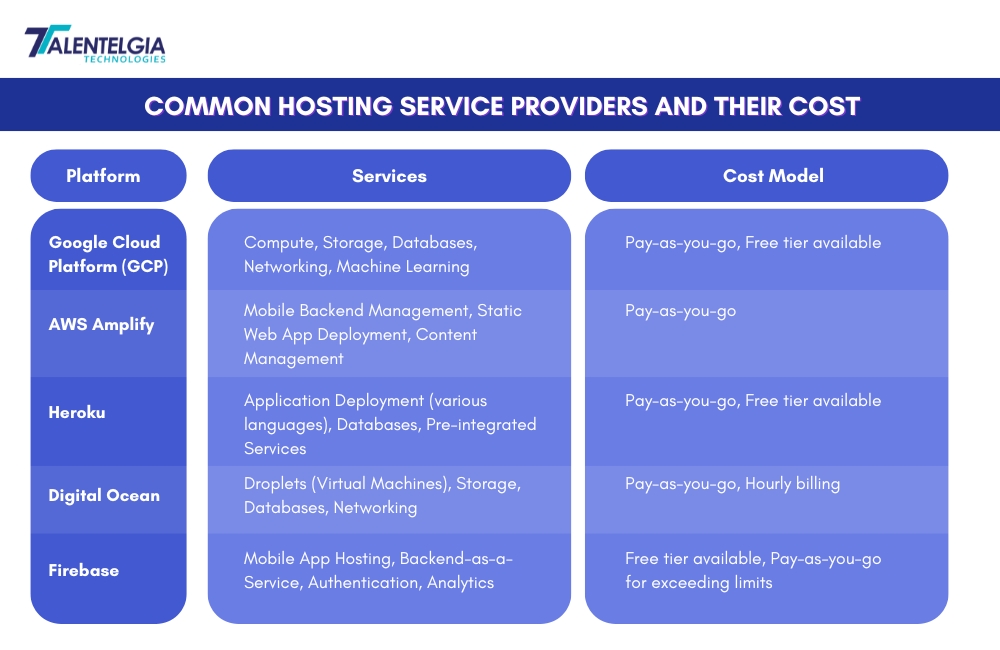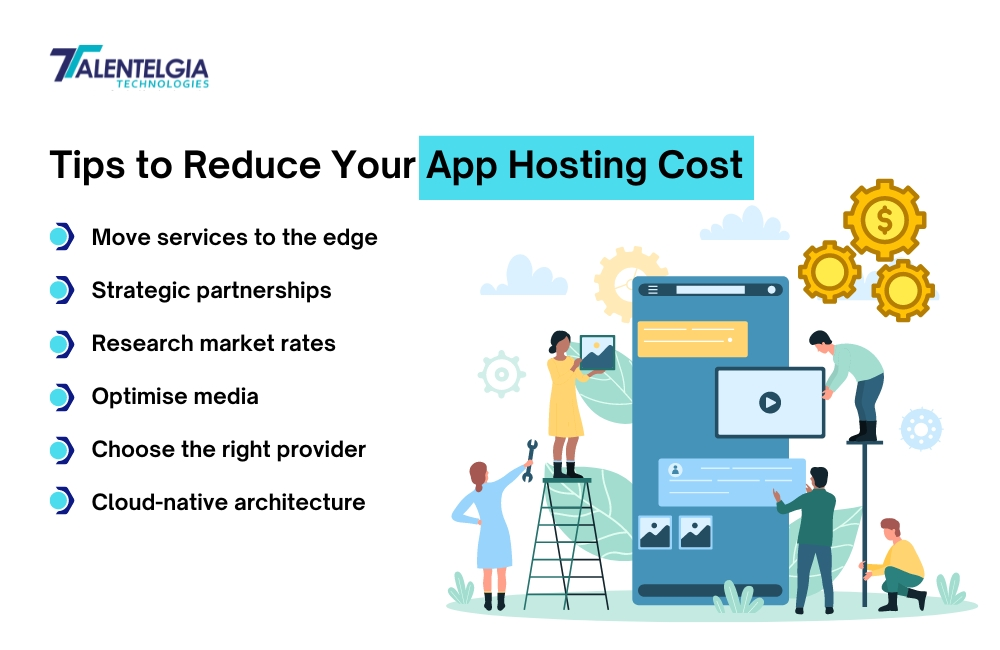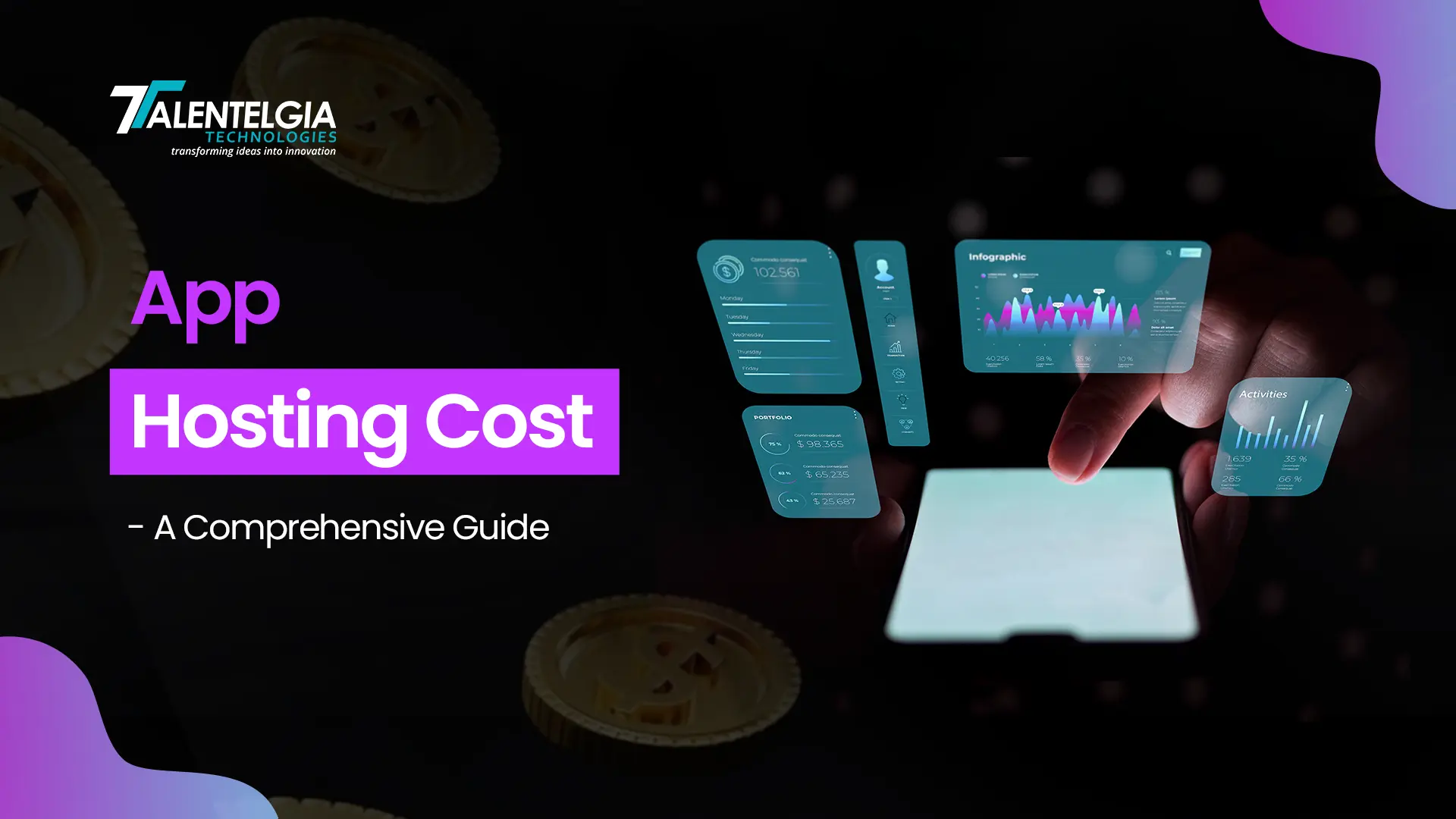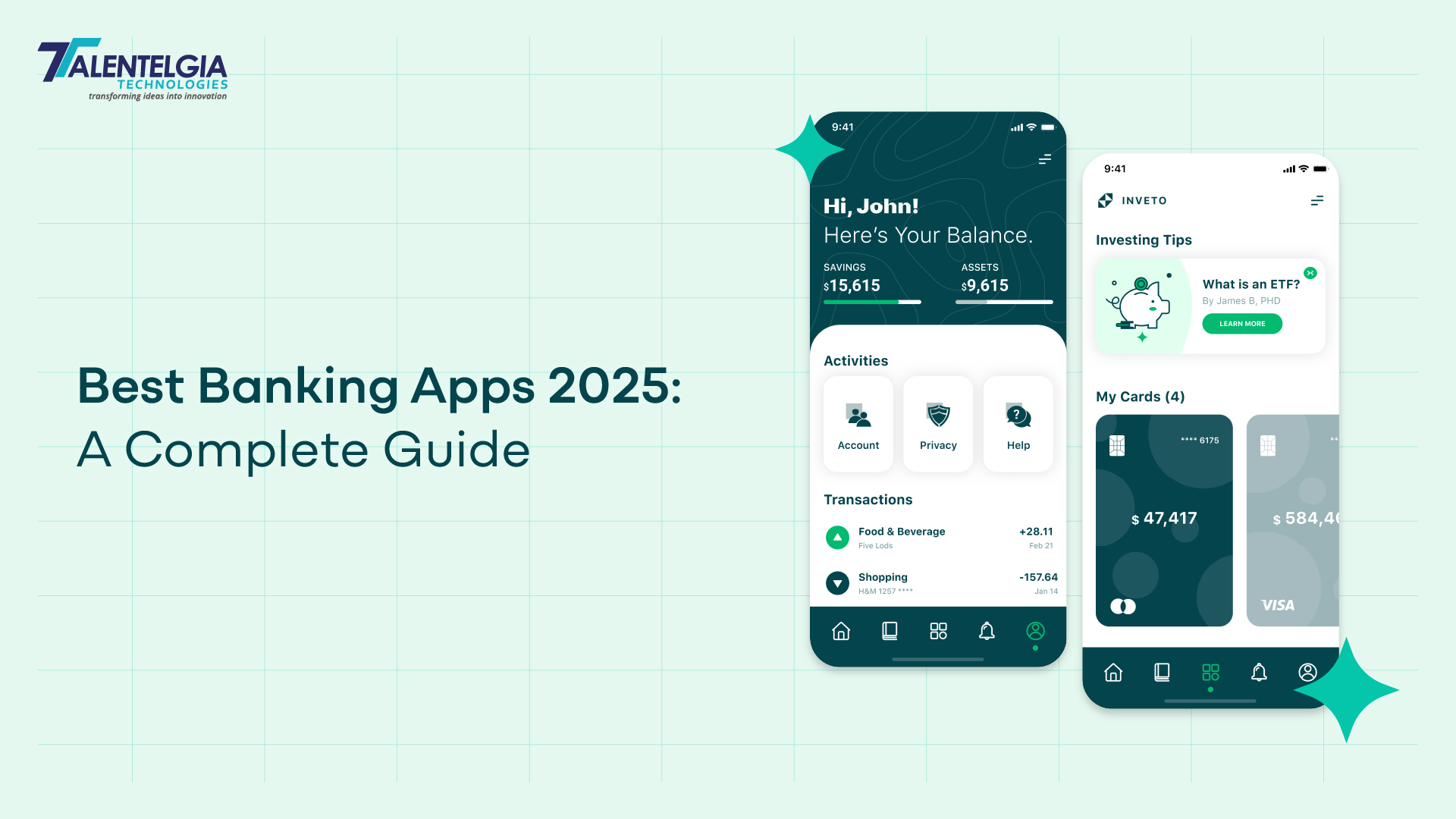Creating apps is a demanding process that requires determination and effort. It can often feel like an endless journey that continues even after the initial phase is done. Therefore, app hosting cost is often one of the first questions businesses think about. So let us begin by understanding what it exactly is.
App hosting, also known as application hosting, is a service that allows businesses to run their applications on a third party’s infrastructure, either on servers or in the cloud. This process provides the necessary services and infrastructure to deploy, run, and manage an application’s server-side components.
There are numerous factors to manage this cost, from infrastructure and scalability to operations and security, to ensure that your app is well-received by users and costs stay in check.
Factors that Affect App Hosting Cost
The cost of hosting a mobile app varies based on its size and complexity. Apps are typically classified into three categories:
1. App size
Small applications have limited functions. They are designed for a single platform and are without API integration or backend development. At the same time, medium apps are developed for a single platform with custom user interface design and payment features, or for multiple platforms with less complexity.
Large apps are complex applications with features like multi-language support, third-party integrations, professional design, extensive backend development, and more.
2. Simple & complex apps
The type of app significantly impacts the hosting cost. Simple apps are less expensive, while gaming, hybrid, or native apps increase hosting costs. Furthermore, picking Android apps vs iOS apps, also decides the final costs.
3. Platforms & Devices
The cost also depends on the platforms and devices the app is built for. Hosting for one platform is cheaper than for multiple platforms.
The Average Cost of App Hosting
Hosting mobile apps is a different experience for everyone. The final cost depends on the unique requirements of each business. So consider your app’s needs and budget before starting.
For instance, a news app with minimal data storage (around 5GB) and a moderate user base (10,000 daily users, consuming 2MB/user/day) might find a budget-friendly option like DigitalOcean suitable, costing around $50 per month. On the other hand, a high-traffic gaming app with moderate data storage (around 20GB) but a massive user base (500,000 daily users, consuming 100MB/user/day) would likely need a more robust provider like Google Cloud Platform, even if it comes at a higher cost, potentially reaching $5,100 per month.
By carefully estimating your data storage and traffic volume, you can select a hosting provider that offers the best value for your app. This ensures your app is reliably hosted without breaking the bank. Just remember, a little planning goes a long way!
Top Hosting Service Providers

Google Cloud Platform (GCP)
This suite of cloud-based services is built on the same infrastructure that powers popular Google products like Search, Gmail, and Drive. Its intuitive, web-based interface allows users to efficiently manage cloud resources and products.
A significant advantage of GCP is its integration with Google’s advanced machine learning capabilities, enabling faster app development and providing valuable business insights to your team.
Additionally, Google Cloud platform offers robust security protocols to protect your projects and provides access to Google’s integrated applications for seamless collaboration, including video calling, email, and document sharing. You can start using GCP for free and pay as your usage scales.
AWS Amplify
AWS Amplify is designed to work to develop full-stack, scalable mobile and web applications. It is built on Amazon Web Services, leveraging its robust infrastructure.
Amplify boasts an impressive list of features, including easy management of app backends, instantaneous deployment of static web applications, and the ability to manage app contents outside the AWS console. It supports a wide range of web and mobile frameworks, ensuring compatibility with various development environments.
While AWS Amplify may seem like a basic script platform, it excels in providing robust mobile backends.
Firebase
Firebase, a Google product, is a reliable mobile hosting service and backend-as-a-service (BaaS) platform. It provides development methods and solutions that enable developers to build mobile and web applications without the need for server-side programming.
It integrates with a variety of Google and third-party services, including authentication, hosting, analytics, and cloud messaging. It has a pay-as-you-go model, making it a cost-effective option.
Heroku
Heroku is a cloud application platform, offering a container-based service that has evolved to support multiple programming languages, including Java, Python, Node.js, and more. It provides a flexible and elegant solution for developers, abstracting away infrastructure management complexities.
With Heroku, applications run inside smart containers in a fully managed runtime environment, ensuring optimal performance and security. Setting up databases is straightforward, and PostgreSQL is both reliable and secure, offering continuous protection with database forking and encryption.
Heroku also offers a range of pre-integrated services, such as New Relic, SendGrid, and Fastly, to enhance and extend your applications’ capabilities effortlessly.
Digital Ocean
Digital Ocean is an open-source, comprehensive cloud computing platform designed to help developers build and host applications rapidly. It provides a wide range of pre-packaged services, including computing, storage, databases, and networking tools, giving developers the flexibility to control their infrastructure or opt for managed services.
With products like Droplets and floating IPs, developers can take full control of their website and mobile app infrastructure. Alternatively, Digital Ocean also offers managed infrastructure services, including load balancers and managed databases, to simplify your workflow.
Digital Ocean’s simple APIs, CLIs, and UI streamline application development, allowing developers to focus on innovation rather than infrastructure setup. Its monthly billing cycles and pay-as-you-go model make expense management more accessible as your business grows.
How to Reduce Your App Hosting Cost

Move services to the edge
Relocating services to the edge and offloading data can significantly curb cloud hosting expenses. This approach also reduces processing and bandwidth costs, as data doesn’t need to travel as frequently to the server hosting the site. Distributed footprints even reduce potential outage costs: While a cloud server outage takes down websites, traffic can be rerouted if an edge node fails.
Implement strategic partnerships
A reliable method for reducing web hosting costs is to devise and execute a robust partnership strategy that enables transactions across various partner channels without incurring additional hosting expenses. This ensures deep penetration across customer segments without any loss of sales potential.
Stay informed about market rates
Keep a close eye on the market value of cloud-based services by regularly reviewing your ISP’s billing practices. While you may not want to switch providers frequently, staying informed about the latest rates can help you negotiate better deals or identify more cost-effective options.
Optimise media
Images and videos can significantly increase bandwidth and storage requirements and slow down your website during peak hours or on slower connections. Optimize these media assets to reduce hosting costs and improve website performance.
Choose the right plan and provider
Carefully assess your traffic and potential traffic to select the most suitable hosting plan and provider. For example, consider using AWS for your back-end infrastructure, as it offers benefits tailored to these use cases, and opt for a flat-fee hosting plan for your front end to manage costs effectively.
Embrace cloud-native architecture
Adopting a cloud-native web application architecture can help optimize web apps and reduce costs. This involves creating lean, lightweight web apps (e.g., single-page apps) and running business logic and heavy processing, such as content optimization, within microservices that communicate with the web apps via APIs
Frequently Asked Questions
How do scaling and traffic impact app hosting expenses?
Scaling and increased traffic can raise hosting expenses as more resources are required to maintain performance. Hosting plans that automatically scale to handle higher demand can lead to variable costs depending on usage.
What additional costs should be considered beyond basic app hosting fees?
Beyond basic hosting fees, consider costs for data storage, security features, backups, and technical support. These additional services ensure your app runs smoothly and securely but can add to the overall expense.
What are the potential hidden costs of app hosting?
Hidden costs of app hosting might include charges for exceeding data transfer limits, premium support services, and software licensing fees. These unexpected expenses can accumulate, increasing the total cost of hosting.
Conclusion
Hosting is an important part of every app. And, the app hosting cost varies for every application. A successful app with millions of daily users may need a more robust configuration and potentially more expensive user resources than an app that has just launched and is gaining traction. This provides you with an estimate of standard application hosting costs to help you plan accordingly. There are many cloud service providers each offering different plans for different needs. Scale your hosting costs as your application grows. Some platforms offer free tiers and extensive resources, making it ideal for startups and small deployments. So, when choosing a hosting provider, you should consider your current and future application needs, your user base, and the level of service you require. So make an informed decision about hosting costs by going through the guide above and ensure your mobile app has the resources it needs to succeed.


 Healthcare App Development Services
Healthcare App Development Services
 Real Estate Web Development Services
Real Estate Web Development Services
 E-Commerce App Development Services
E-Commerce App Development Services E-Commerce Web Development Services
E-Commerce Web Development Services Blockchain E-commerce Development Company
Blockchain E-commerce Development Company
 Fintech App Development Services
Fintech App Development Services Fintech Web Development
Fintech Web Development Blockchain Fintech Development Company
Blockchain Fintech Development Company
 E-Learning App Development Services
E-Learning App Development Services
 Restaurant App Development Company
Restaurant App Development Company
 Mobile Game Development Company
Mobile Game Development Company
 Travel App Development Company
Travel App Development Company
 Automotive Web Design
Automotive Web Design
 AI Traffic Management System
AI Traffic Management System
 AI Inventory Management Software
AI Inventory Management Software
 AI Software Development
AI Software Development  AI Development Company
AI Development Company  AI App Development Services
AI App Development Services  ChatGPT integration services
ChatGPT integration services  AI Integration Services
AI Integration Services  Generative AI Development Services
Generative AI Development Services  Natural Language Processing Company
Natural Language Processing Company Machine Learning Development
Machine Learning Development  Machine learning consulting services
Machine learning consulting services  Blockchain Development
Blockchain Development  Blockchain Software Development
Blockchain Software Development  Smart Contract Development Company
Smart Contract Development Company  NFT Marketplace Development Services
NFT Marketplace Development Services  Asset Tokenization Company
Asset Tokenization Company DeFi Wallet Development Company
DeFi Wallet Development Company Mobile App Development
Mobile App Development  IOS App Development
IOS App Development  Android App Development
Android App Development  Cross-Platform App Development
Cross-Platform App Development  Augmented Reality (AR) App Development
Augmented Reality (AR) App Development  Virtual Reality (VR) App Development
Virtual Reality (VR) App Development  Web App Development
Web App Development  SaaS App Development
SaaS App Development Flutter
Flutter  React Native
React Native  Swift (IOS)
Swift (IOS)  Kotlin (Android)
Kotlin (Android)  Mean Stack Development
Mean Stack Development  AngularJS Development
AngularJS Development  MongoDB Development
MongoDB Development  Nodejs Development
Nodejs Development  Database Development
Database Development Ruby on Rails Development
Ruby on Rails Development Expressjs Development
Expressjs Development  Full Stack Development
Full Stack Development  Web Development Services
Web Development Services  Laravel Development
Laravel Development  LAMP Development
LAMP Development  Custom PHP Development
Custom PHP Development  .Net Development
.Net Development  User Experience Design Services
User Experience Design Services  User Interface Design Services
User Interface Design Services  Automated Testing
Automated Testing  Manual Testing
Manual Testing  Digital Marketing Services
Digital Marketing Services 
 Ride-Sharing And Taxi Services
Ride-Sharing And Taxi Services Food Delivery Services
Food Delivery Services Grocery Delivery Services
Grocery Delivery Services Transportation And Logistics
Transportation And Logistics Car Wash App
Car Wash App Home Services App
Home Services App ERP Development Services
ERP Development Services CMS Development Services
CMS Development Services LMS Development
LMS Development CRM Development
CRM Development DevOps Development Services
DevOps Development Services AI Business Solutions
AI Business Solutions AI Cloud Solutions
AI Cloud Solutions AI Chatbot Development
AI Chatbot Development API Development
API Development Blockchain Product Development
Blockchain Product Development Cryptocurrency Wallet Development
Cryptocurrency Wallet Development About Talentelgia
About Talentelgia  Our Team
Our Team  Our Culture
Our Culture 
 Healthcare App Development Services
Healthcare App Development Services Real Estate Web Development Services
Real Estate Web Development Services E-Commerce App Development Services
E-Commerce App Development Services E-Commerce Web Development Services
E-Commerce Web Development Services Blockchain E-commerce
Development Company
Blockchain E-commerce
Development Company Fintech App Development Services
Fintech App Development Services Finance Web Development
Finance Web Development Blockchain Fintech
Development Company
Blockchain Fintech
Development Company E-Learning App Development Services
E-Learning App Development Services Restaurant App Development Company
Restaurant App Development Company Mobile Game Development Company
Mobile Game Development Company Travel App Development Company
Travel App Development Company Automotive Web Design
Automotive Web Design AI Traffic Management System
AI Traffic Management System AI Inventory Management Software
AI Inventory Management Software AI Software Development
AI Software Development AI Development Company
AI Development Company ChatGPT integration services
ChatGPT integration services AI Integration Services
AI Integration Services Machine Learning Development
Machine Learning Development Machine learning consulting services
Machine learning consulting services Blockchain Development
Blockchain Development Blockchain Software Development
Blockchain Software Development Smart contract development company
Smart contract development company NFT marketplace development services
NFT marketplace development services IOS App Development
IOS App Development Android App Development
Android App Development Cross-Platform App Development
Cross-Platform App Development Augmented Reality (AR) App
Development
Augmented Reality (AR) App
Development Virtual Reality (VR) App Development
Virtual Reality (VR) App Development Web App Development
Web App Development Flutter
Flutter React
Native
React
Native Swift
(IOS)
Swift
(IOS) Kotlin (Android)
Kotlin (Android) MEAN Stack Development
MEAN Stack Development AngularJS Development
AngularJS Development MongoDB Development
MongoDB Development Nodejs Development
Nodejs Development Database development services
Database development services Ruby on Rails Development services
Ruby on Rails Development services Expressjs Development
Expressjs Development Full Stack Development
Full Stack Development Web Development Services
Web Development Services Laravel Development
Laravel Development LAMP
Development
LAMP
Development Custom PHP Development
Custom PHP Development User Experience Design Services
User Experience Design Services User Interface Design Services
User Interface Design Services Automated Testing
Automated Testing Manual
Testing
Manual
Testing About Talentelgia
About Talentelgia Our Team
Our Team Our Culture
Our Culture

















 Write us on:
Write us on:  Business queries:
Business queries:  HR:
HR: 




